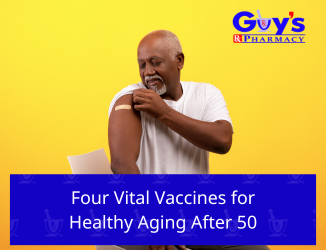As we age, staying on top of our health means being proactive. A commitment to healthy living and regular check-ups is just a start. Our bodies change over the years, weakening our immune system and making it harder to bounce back from illnesses. That’s why keeping current with vaccinations is so important.
For many, vaccines are a vital line of defense. Getting immunized protects our bodies and those who are more vulnerable to illness. This blog post highlights four important vaccines for adults over 50, their benefits, and some common concerns about vaccination.
The Four Vital Vaccines for Aging Adults
Influenza (Flu) Vaccine
The flu is dangerous for seniors, leading to serious diseases such as pneumonia or worsening pre-existing conditions. While an annual flu vaccine is recommended for everyone, it is particularly important for those over 50.
The flu vaccine is updated yearly to combat the most common strains expected each flu season. This regular adjustment reduces flu-related hospitalizations, especially among older adults. Getting your flu shot early in the fall is a good idea. Early immunization ensures you are fully protected when flu season is at its worst.
Pneumococcal Vaccine
In addition to the flu vaccine, the pneumococcal vaccine is another critical vaccination for seniors. It protects against pneumococcal diseases, which include pneumonia, meningitis, and bloodstream infections. While this bacterial infection can affect individuals of any age, it poses a significant danger to adults over 65. The pneumococcal vaccine is essential for these groups in preventing severe health complications and ensuring better overall health.
The CDC now recommends the Prevnar 20 vaccine for adults over 65 as it provides comprehensive protection against pneumonia with just one shot. This single-dose vaccine replaces the previous two-step process, offering a more convenient and effective way to significantly reduce the risk of serious pneumococcal infections.
Shingles Vaccine
Another essential vaccination is the shingles vaccine. Shingles is a painful rash caused by the varicella-zoster virus, which causes chickenpox. The risk of developing shingles increases with age, particularly after 50.
The vaccine helps prevent shingles and the pain that can occur afterwards, known as postherpetic neuralgia. Shingrix is given in two doses, with the second shot administered two to six months after the first.
COVID-19 Vaccine
The COVID-19 pandemic has highlighted the critical importance of vaccinations in managing public health. Older adults are especially at risk for severe outcomes from COVID-19.
Keeping up with vaccinations and boosters is crucial in preventing the spread of the virus and reducing severe health outcomes. The CDC recommends that older adults receive a COVID-19 booster shot at least once a year.
Addressing Vaccine Hesitancy
Despite the clear benefits, some remain hesitant about receiving vaccines because of misconceptions and myths. Addressing these concerns with compassion and the facts information can help encourage vaccine adoption.
Myth: Vaccines can cause severe side effects worse than the disease.
Reality: Vaccines may cause mild side effects, such as soreness or low-grade fever, but severe side effects are very rare. This is much safer than the complications of the diseases they prevent.
Myth: Vaccines aren’t always effective.
Reality: While no vaccine offers 100% protection, it significantly reduces the risk of severe illness and life-threatening complications.
Myth: Natural immunity is better than vaccine-acquired immunity.
Reality: Relying on natural immunity can be dangerous, as the disease itself can cause severe health issues and long-term complications. Vaccines provide a safe means to develop immunity without the risk of contracting the disease.
Common Side Effects of Vaccines
It’s normal to experience some side effects after getting vaccinated, which are generally mild and temporary.
Understanding these can help ease concerns:
- Soreness or Redness at Injection Site: This is the most common side effect and usually subsides within a day or two.
- Low-Grade Fever: A mild fever is a natural response as your body builds immunity.
- Fatigue: Feeling tired for a day or two is a typical response to many vaccines.
- Muscle Aches: Some people experience mild muscle pain, which resolves quickly.
- Headache: A mild headache can occur after vaccination but usually goes away on its own.
These side effects are a sign that your body is building protection. If you have any concerns or experience more severe reactions, it’s essential to contact your healthcare provider.
A Healthy Step Forward
Vaccinations are a cornerstone of preventive healthcare for older adults. By staying informed and proactive about vaccinations, seniors can enjoy a healthier, more active lifestyle while minimizing the risk factors of severe illnesses. Remember, protecting yourself also means protecting those around you. Make vaccinations an important part of your health care routine and consult with your healthcare provider to ensure your vaccination schedule is up-to-date.
At Guy’s Pharmacy, we can support multiple aspects of senior health, including these important vaccines after 50. Staying healthy and vigilant is the best way to enjoy the golden years of life. Are you keeping your vaccinations current? Stay vaccinated to stay healthy and protect not just yourself but also those around you. Contact us to learn more about your vaccination options.

